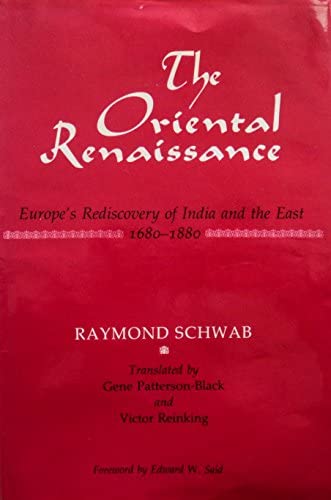Raymond Schwab, The Oriental Renaissance: Europe’s Rediscovery of India and the East, 1680–1880 (1950)
This is an insane book.
I don’t mean that it’s bad, or that it’s wrong. The basic premise — that there was a second, oriental renaissance in Europe that followed the first, Greco-Roman renaissance, and that this second renaissance, precipitated by the discovery and translation of ancient (mostly) Sanskrit texts like the Vedas, the Bhagavad Gita, and the Bhagava Purana, had a profound effect on European philosophy and literature — is hard to argue with, especially after all of the data Schwab marshals.
And boy, does he marshal. The editors of this volume — an English translation of the 1950 French original, produced in the 1970s — warn that the bibliography is only partial, and couldn’t possibly encompass every work Schwab mentions. It runs to twenty-six pages.
What comes off as insane about this book is Schwab’s casual familiarity with the entire world of French and German orientalist scholarship for two hundred years. By all appearances, Schwab somehow not only read all the major works by all the major scholars, but also all of their minor works, and all the works of the minor scholars too, and the entire runs of periodicals like the Journal Asiatique and Reveu de deux Mondes. He knows what this minor figure said about that minor figure in someone’s salon in 1814. He is also intimately familiar with the literature and philosophy of the time, everyone from Hugo and Nerval to Goethe and Schopenhauer.
I suppose Schwab had time on his hands. Simmering beneath all of this Borgesian erudition is a thesis that one imagines must have been personal. For Schwab, the French and Germans took the oriental renaissance in two incompatible directions. For the Revolutionary French, the discoveries of oriental antiquity led to a kind of universalizing principle, a search for the commonalities across all times and nations. The Germans, meanwhile, smarting from the humiliation of French conquest and growing increasingly isolated as French rather than German became the international European language, somehow linked themselves to the Indo-Aryans and imagined that the deeper origins of all valuable culture belonged not to the Greeks and Romans, but to the Aryans from whom the Greeks and Romans borrowed their culture and to the Germanic barbarians who conquered Europe thereafter.
The German theory doesn’t hold up to scrutiny or make much sense, but it was a fantasy that played out gruesomely in the years Schwab must have been conducting his research. As a Jew, Schwab was dismissed from his government post in Paris in 1940, then reinstated in 1944. I haven’t been able to discover how he survived the war — this man who delves into the personal lives of generations of scholars never says a word about himself — but it must not have been pleasant.
Reading this book was a slog, though I would recommend it to anyone whose field of study is what used to be called orientalism. It is very French, which means a lot of abstract diction and philosophical maundering that may or may not mean something if you can parse it, as well as an assumption that the reader knows all about the Second Empire and the Paris Commune and the like, in the way that an American author might drop a casual reference to Brown v. Board of Education or Prohibition-era bootlegging and expect readers to understand it. The English edition has a preface by Edward Said, which is as erudite and impenetrable as his Orientalism. (Indeed, it was Said who led me to Schwab by continually quoting him, and you can see that Said picked up not just facts but a whole style of discourse, not necessarily for the good. Orientalism can sometimes read like an angried up version of The Oriental Renaissance.) I’m fairly sure I didn’t understand half of this book, but I’m glad I read it.

